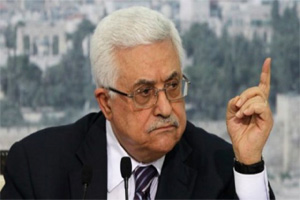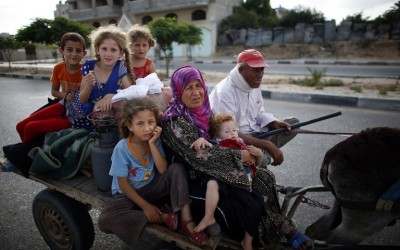 Palestinian president Mahmoud Abbas has asked the United Nations to put the state of Palestine under “international protection” due to the worsening violence in the Gaza Strip.
Palestinian president Mahmoud Abbas has asked the United Nations to put the state of Palestine under “international protection” due to the worsening violence in the Gaza Strip.
At least 166 Palestinians, mostly civilians, have been killed in Gaza in the seven days of conflict between the two sides, while more than 1,000 have been injured.
No Israelis have been killed so far, although militants in Gaza have pounded the country with nearly 700 rockets since the fighting began, with a further 170 intercepted by the Jewish state’s Iron Dome defence system.
For the first time since the current conflict began, Israeli ground troops entered Gaza on Sunday in a brief raid against a rocket launch site on the coast.
They came under fire from Hamas and four Israeli navy commandos were wounded, but there is no sign yet of a more extensive ground invasion.
Israel says a ground invasion of Gaza remains an option, and it has already mobilised more than 30,000 reservists to do so, but most attacks have so far been from the air, hitting about 1,200 targets in the territory.
“Israel went deeper in everything and its offensive on the Palestinian nation should be stopped,” Mr Abbas said.
The president has presented a letter, addressed to UN secretary-general Ban Ki-moon, to UN special envoy Robert Serry.
He met with Mr Serry on Sunday (local time) in the West Bank city of Ramallah.
“The Palestinian leadership is in a continuous meeting, in particular the joint command of the executive and central committees,” Mr Abbas said.
“Today they took a decision to call for international protection for the Palestinian lands and nation.”
UN deputy spokesman Farhan Haq confirmed receipt of the letter.
“We … will need to study it before responding further,” Mr Haq said in a short statement in New York.
Hamas to blame for Gaza civilian casualties: Netanyahu
Israeli prime minister Benjamin Netanyahu said Hamas, the Islamist group which runs the Gaza Strip, was to blame for all civilian casualties in Gaza, as he defended Israel’s use of air strikes to counter rocket attacks from the territory.
Despite international calls for a ceasefire, Mr Netanyahu told CBS’s Face the Nation that Israel would not quit until it had achieved “sustainable quiet and security for our people”.
“We use whatever means are necessary to defend our people, as would the United States or any other government faced with such a predicament,” he said when asked about whether Israeli ground forces would go into Gaza.
Mr Netanyahu argued that Hamas was to blame for any civilian casualties because it was embedding rockets and command posts “in homes, hospitals, next to kindergartens, mosques”.
“So naturally, they are responsible for all the civilian deaths that occur accidentally,” he said.
“We’re sorry for any accidental civilian deaths, but it’s Hamas that bears complete responsibility for such civilian casualties.”
Aid workers describe desperation in Gaza
Osama Damo from the charity Save the Children is currently in Gaza and says dozens of children are among the victims.
“The situation in the hospitals is …a disaster at this stage,” he said.
“They are overwhelmed, they are running out of disposables, medical disposables and medical items and medications.”
Christopher Gunness, a spokesman for the United Nations Relief and Works Agency, says in addition to the deaths many people are displaced.
“There has been vast displacement internally, particularly in northern Gaza today,” he said.
“By midday it was about 10,000 people who’d come to our facilities and by the end of day 17,000 and rising.
“We had opened 10 UNRWA schools to receive people, we’ve now opened 20 UNRWA facilities.
“Our workers in Gaza are working through the night 24/7 to bring supper to the needy, the sick, the elderly, the dying. It is a desperate situation in Gaza.”
Mr Damo says civilians need urgent protection because the area is one of the most densely populated areas of the planet.
“We are speaking about 1.7 million who are living in 365 square kilometres; any use of explosive weapons will result in casualties amongst civilians,” he said.
“If the ceasefire is not re-established and this operation continues, the main cost that we will be seeing will be human cost, especially among the civilians.”
International pressure increases to end conflict
International pressure on both sides for a return to calm has increased, with the UN Security Council calling for a cessation of hostilities and Western foreign ministers due to meet to weigh strategy.
The Palestine Liberation Organisation (PLO) said Mr Abbas also wanted a commission of inquiry into Israel’s relentless air bombardment of the Gaza Strip aimed at halting militant rocket fire into the Jewish state.
The president has asked Switzerland, the depository of the fourth Geneva Convention on the protection of civilians in wartime, to ask signatories to place sanctions on Israel which as the occupying power is responsible for the safety of civilians.
Senior PLO member Mr Ashrawi said that when Arab League foreign ministers meet in Cairo to discuss the Gaza crisis, Palestinian leaders will ask for an adoption of “a draft resolution at the ministerial level” to be presented to the UN Security Council.
The Palestinians would also seek an emergency meeting of the UN Human Rights Council “to deal with the grave conditions in Gaza and hold Israel to account for its violations of international law and international humanitarian law”.
The UN says more than 10,000 people have already sought refuge in its installations.
Hamas has urged the residents to return or stay put, calling Israel’s warning about a ground invasion psychological warfare.
But Mr Netanyahu says Hamas is using the residents of Gaza as human shields.
Clashes erupt during protests in Paris
Meanwhile, thousands of pro-Palestinian protesters rallied in Sydney on Sunday, calling for an end to Israeli air strikes on the Gaza Strip.
Waving placards and chanting “free, free Palestine; free, free Gaza,” the crowd of between 2,000 and 3,000 people occupied the steps of Sydney Town Hall for hours in a rowdy but peaceful protest.
In Paris on Sunday, clashes erupted as thousands of people protested against Israel and in support of residents in the Gaza Strip.
Several thousand demonstrators walked calmly through the streets of Paris behind a large banner that read “Total Support for the Struggle of the Palestinian People”.
But clashes erupted at the end of the march on Bastille Square, with people throwing projectiles onto a cordon of police who responded with tear gas.
Meanwhile, between 2,300 and 6,000 people protested peacefully in the northern city of Lille, according to differing figures provided by the police and organizers.
The ABC’s Matt Brown in Jerusalem- report
Rockets are still streaking out of Gaza into the sky and heading north into Israel, but notably there’s a more low-key feel around the border on the Israeli side than previous engagements.
There is a build up of infantry and armour, tanks, armoured personnel carriers, even trenches dug deep into the earth for trucks, which I presume might be carrying ammunition to resupply troops on the ground, so there is this feeling that a ground operation could be underway in the coming days, perhaps weeks, but certainly not imminent.
I note a massive commando raid in the past 36 hours and perhaps we’re going to see more like that, a smaller operation but one that requires substantial support from the border region.
The Israeli military says the town of Beit Lahiya which is the northern-most town in the Gaza strip is used to fire a very large proportion of the rockets that head into Israel.
It’s dropped leaflets in that area warning the residents to leave, telling them that it will attack the rocket launching facilities there. More than 10,000 have taken refuge in UN facilities in the Gaza strip. I’ve seen this in previous operations, where these areas can become almost like ghost towns, but there are a few things to remember.
The sick and the elderly often don’t get out. People who aren’t sure they want to uproot their family and take them off to live in a school sometimes don’t leave. There are the defiant people who don’t leave.

There’s no guarantee that those areas will be empty of civilians if and when the Israeli military does begin to attack the rocket launching sites it says it’s identified there.
Hamas’s rockets have grown more sophisticated and with a longer range since Israel pulled out of Gaza in 2005.
The Israeli blockade on the only authorised crossing for food and building materials into Gaza continues, so all of these long-term problems remain.
I guess that’s one of the conundrums about this latest operation and the latest bout of rocket firing. What is the end purpose? It won’t be, it seems, any kind of substantial change to what was the status quo prior to this.
ABC News
